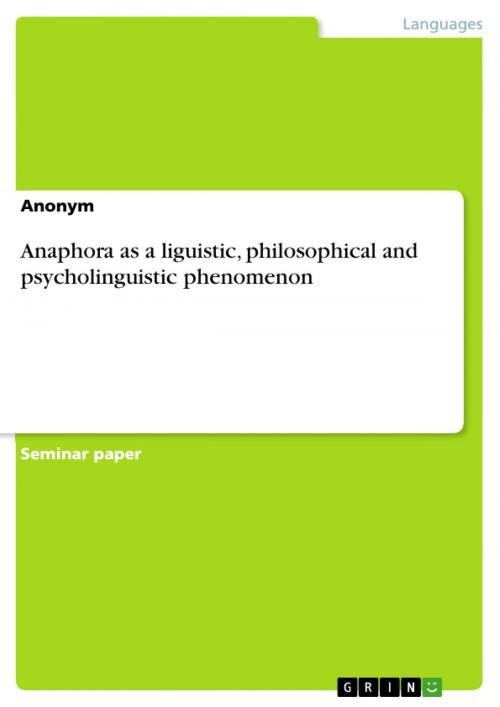Anaphora as a liguistic, philosophical and psycholinguistic phenomenon
Nonfiction, Reference & Language, Language Arts, Linguistics| Author: | Anonymous | ISBN: | 9783638584937 |
| Publisher: | GRIN Publishing | Publication: | January 14, 2007 |
| Imprint: | GRIN Publishing | Language: | English |
| Author: | Anonymous |
| ISBN: | 9783638584937 |
| Publisher: | GRIN Publishing |
| Publication: | January 14, 2007 |
| Imprint: | GRIN Publishing |
| Language: | English |
Seminar paper from the year 2006 in the subject Speech Science / Linguistics, grade: 1,3, Northwestern University, 8 entries in the bibliography, language: English, abstract: In this paper I will try to examine how different academic fields approach anaphoric phenomena. The fields involved here are primarily philosophy and linguistics, with its subfields of semantics, syntax, and psycholinguistics. Especially in linguistics, Anaphora is traditionally thought of in opposition to deixis. Philosophy is not so much directly concerned with anaphora, but rather more generally with the processes of reference; however this larger discussion adds to an understanding of anaphoric processes too. Formal semantics, again, has developed a new dichotomy of bound anaphora versus referential ones - instead of the classical one between anaphora and deixis. Given these different approaches, I will try to find those within the two broad fields which seem to be best compatible. I will especially present one linguistic approach that might be compatible with at least one strand of the philosophical literature, and also with psycholinguistic insights into the matter. My hope is that Sag & Hankamer's paper of 1984 fulfills these criteria and thus allows for an interdisciplinary view of anaphora. Sag & Hankamer's approach will however only be addressed later. First, I will give an oversight of what anaphora is supposed to mean linguistically and then go on to present what philosophy makes of the phenomenon.
Seminar paper from the year 2006 in the subject Speech Science / Linguistics, grade: 1,3, Northwestern University, 8 entries in the bibliography, language: English, abstract: In this paper I will try to examine how different academic fields approach anaphoric phenomena. The fields involved here are primarily philosophy and linguistics, with its subfields of semantics, syntax, and psycholinguistics. Especially in linguistics, Anaphora is traditionally thought of in opposition to deixis. Philosophy is not so much directly concerned with anaphora, but rather more generally with the processes of reference; however this larger discussion adds to an understanding of anaphoric processes too. Formal semantics, again, has developed a new dichotomy of bound anaphora versus referential ones - instead of the classical one between anaphora and deixis. Given these different approaches, I will try to find those within the two broad fields which seem to be best compatible. I will especially present one linguistic approach that might be compatible with at least one strand of the philosophical literature, and also with psycholinguistic insights into the matter. My hope is that Sag & Hankamer's paper of 1984 fulfills these criteria and thus allows for an interdisciplinary view of anaphora. Sag & Hankamer's approach will however only be addressed later. First, I will give an oversight of what anaphora is supposed to mean linguistically and then go on to present what philosophy makes of the phenomenon.















